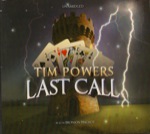
 Last Call
Last Call
By Tim Powers; Read by Bronson Pinchot
16 CDs – Approx. 19.1 Hours [UNABRIDGED]
Publisher: Blackstone Audio
Published: December 2010
ISBN: 9781441757364
Themes: / Fantasy / Gambling / Immortality / Las Vegas / Poetry / Arthurian Legend / Greek Mythology / Egyptian Mythology
Scott Crane abandoned his career as a professional poker player twenty years ago and hasn’t returned to Las Vegas, or held a hand of cards, in ten years. But troubling nightmares about a strange poker game he once attended on a houseboat on Lake Mead are drawing him back to the magical city. For the mythic game he believed he won did not end that night in 1969—and the price of his winnings was his soul. Now, a pot far more strange and perilous than he ever could imagine depends on the turning of a card. Enchantingly dark and compellingly real, this World Fantasy Award–winning novel is a masterpiece of magic realism set in the gritty, dazzling underworld known as Las Vegas.
Tim Powers’ Last Call (1992 William Morrow and Co.; 2010 Blackstone Audio, Inc.) is studded with references to old myths, snatches of T.S. Eliot’s “The Wasteland,” the art of poker playing, and the unique culture and atmosphere of old and new Las Vegas. It contains numerous major and minor characters, overarching themes and subplots, and digressions into probability theory. In other words, it demands close reading and attention to detail. Listening to it in half-hour chunks as I did while driving to work was probably not the best idea, and may have affected my review of the book, but what follows is an honest appraisal.
There’s a lot to like in Last Call, and I lot I liked. At its heart it’s really about the vast, mysterious forces driving the universe and the ways in which they manifest in our lives. Why does tragedy pass over a criminal and take a good person instead? Why does a disease like cancer randomly strike a family man with a wife and children to support? Although life appears chaotic and meaningless, perhaps there are active, purposeful forces of fate at work as well, old gods that exist outside our typical suburban lives but can be sought out and appealed to, and even manipulated. In Last Call Powers breathes new life into ancient myths like the Arthurian Fisher King, the Greek god Dionysus, and the Egyptian goddess Isis, incorporating themes of resurrection and physical health tied to spiritual health. These ancient demigods reappear in the forms of unlikely modern-day characters, including broken-down ex-gambler Scott Crane and his estranged foster-sister Diana. Last Call also includes a cast of memorable bad guys, including a bloated fat hit man Trumbull who is convinced that eternal life can be had through the consumption of raw flesh, and the chief baddie Georges Leon, a mystic who achieves immortality through stealing and possessing the bodies of the living. Crane is the central figure in the story, a man who in 1969 played a portentous game of Assumption with a powerful set of tarot cards. Twenty years later Crane returns for a second game against Leon with nothing less than his soul on the line.
Last Call is ultimately a hopeful book, as it implies that there may be a purpose to our lives and a way to control one’s destiny, if you can read the cards and master the archetypes of the Tarot. In Powers’ hands playing cards are a metaphor for the mysteries of life and the skill and luck required to navigate its uncertain waters.
Neil Gaiman’s American Gods employs a similar conceit of old gods reincarnated in the modern world but I must say I enjoyed Gaiman’s take better. Powers is a talented writer and I enjoyed his descriptions of the seedy soul of Las Vegas, as well as some memorable set-pieces he creates, including an encounter with the ghost of the infamous gangster Bugsy Siegel beneath the waters of Lake Mead. But the slow pace of the narrative, the meandering plotline, the too-numerous characters and plotlines that drop in and out of the story without sufficient explanation and resolution (Crane’s wife Susan, for example), and tedious descriptions of card game after card game make Last Call a difficult listen and at times an outright chore, despite the fine narration by Bronson Pinchot.
Perhaps my lukewarm reaction to Last Call has something to do with the fact that I I’m not a fan of card playing; Vegas is a cool place to visit and I’ve tried my hand at a few slot machines, but sitting down at a table in the company of hardcore gamblers has zero appeal for me. If you read Last Call watch closely for the signs, the subtle flush of cheek or restless eyes that the best card players know how to detect and interpret. As for casual readers: Beware.
Posted by Brian Murphy

The ‘A Good Story is Hard to Find’ podcast discussed Tim Powers’s Declare: http://agoodstoryishardtofind.blogspot.com/2011/09/good-story-019-declare.html
as it says in the magical similar posts list